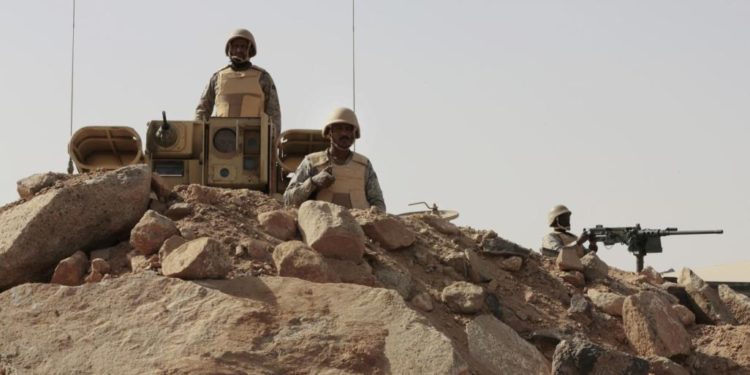
An investigative film revealed secrets and scenes of the Saudi recruitment of Yemenis randomly, and the details of the battles on the southern border of the Kingdom.
The movie, broadcast by Al-Jazeera satellite channel, entitled “Death on the Borders”, reviewed that after the Operation Decisive Storm in 2015, the Saudi regime established military brigades distributed on many fronts on its borders with Yemen.
The program team obtained exclusive scenes showing the effects of the bombing on the city of Al-Raboua in the Kingdom, but the strange thing is the complete absence of the Saudi army from the scene, while Yemeni fighters appeared fighting the border, as the exclusive scenes from Saudi lands documented what is happening in the Yemeni recruitment camps.
The program team search trip started from the brokers who mobilize the fighters and persuade them to go to the southern border of Saudi Arabia, and the team was able to communicate with one of the drivers who transported the fighters to Saudi Arabia, some of whom are not more than 15 years old.
The driver, who insisted on concealing his identity, explained that he was delivering 5 batches per month, but now the number has decreased because people are starting to fear the presence of human trafficking.
He added that at the beginning, the compensation he received was 500 Saudi riyals ($133) per person, but that the amount has decreased since 2018 and has become 20,000 Yemeni riyals ($80). He pointed out that the brokers do not communicate with the Saudis, as communication takes place through the Saudi brigades ‘delegates’, as a sum of money is delivered for each head.
The program team was able to obtain secret records near the “deposit” port, where the arrivals are counted and their IDs are taken to start the registration process.
The secret portrayal of the Saudi port was documented the moment of the crossing to the Saudi side, as the fighters are transported directly and accompanied by a Saudi military force without passing through the Yemeni port or the official check-out.
The records also revealed the details of the mobilization of fighters as conveyed by one of the delegates, as well as a clear indication that the brigade is affiliated with Prince Fahim bin Turki. Here, a special document is issued for each fighter to act as a passport that gives the fighter the right to move across borders to enter the Kingdom of Saudi Arabia.
On September 13, 2019, Yemeni Colonel Bashir Al-Jazmi announced his resignation from his position in the coalition, where he was in charge of the crowd in the coalition camp at the port of depository.
After being forced to hide due to security harassment after his resignation, Al-Jazeera was able to meet him and said that he had resigned with conviction, because he was among those who had hoped for the advent of the Operation, and believed that it came to put an end to the Houthis.
Al-Jazmi added that the “depository” training camp is an executing agency for subordinates, while the coalition is only formal and informative, adding that the existing military units are close to 20,000.
He stated that the percentage of Yemeni fighters recruited does not exceed 15%, while the rest are just citizens who did not receive the simplest types of training unlike the Houthis, stressing that the training does not reach the required level, especially as their fear barrier has not been broken. He also criticized the mechanism for training Yemenis who are recruited to fight in the ranks of Saudi Arabia.
Al-Jazmi considered that one of the most important weaknesses of this training is that it is a virtual training in which no real shooting takes place, so that the fighter’s fear barrier is broken. The film also showed Yemeni fighters carrying wooden sticks instead of real weapons during their exercises.
The program team obtained some religious records that are presented to the Yemeni fighter in Saudi camps, which call for jihad for the sake of God.
For his part, Major General Mohsen Khasrouf, who submitted his resignation directly on Yemeni television, considered that the Kingdom of Saudi Arabia’s keenness not to sacrifice its soldiers is pushing it to replace them with Yemeni youth.
He explained that the fighters are supposed to be in a regular situation, but he described what is going on in Saudi Arabia as outside the framework of humanity and international law, considering that the cards that Yemeni fighters receive are unilateral fraud because there is no form of coordination with any Yemeni regular military body.
The program team was also able to publish records from inside the graves of the Yemeni fighters in Saudi Arabia, where burial takes place collectively and without any identity preserving their privacy, and their bodies are not allowed to be deported to Yemen or their families visit their graves even to give a final look at them.
Ali al-Hijrah, the father of one of the victims who died in the Saudi borders, said that the recruitment of his son came as a result of the circumstances of need, considering that Riyadh exploits the needs of people in conditions of war and extreme costly, adding that he has not yet reached a death certificate or burial of his son.
One of the fighters returning from the border, Hudhaifa Al Hatimi, recounts that after the fear he had received, he shouted at night of panic and was not treated until after returning to Yemen.
For his part, Colonel Sinan Al-Hameeri said that the phenomenon of youth recruitment in Taiz Governorate started after the storm of decisiveness as a result of the Houthis attacking Saudi Arabia and asked young people to protect its borders.